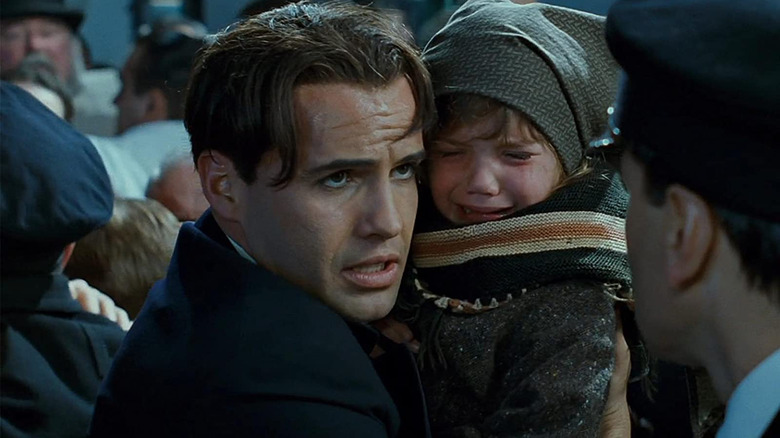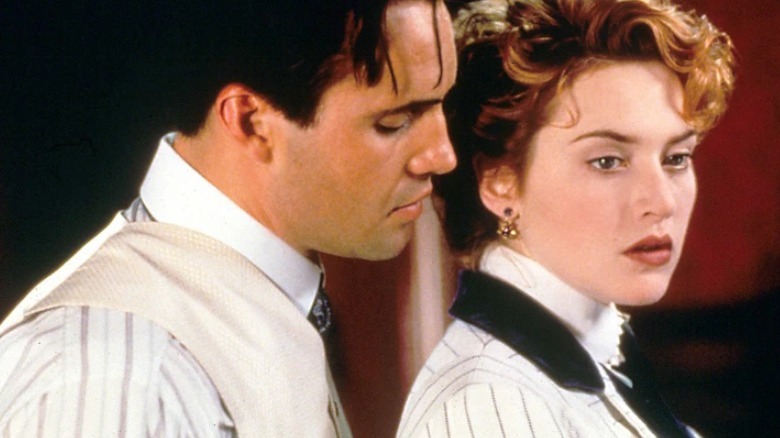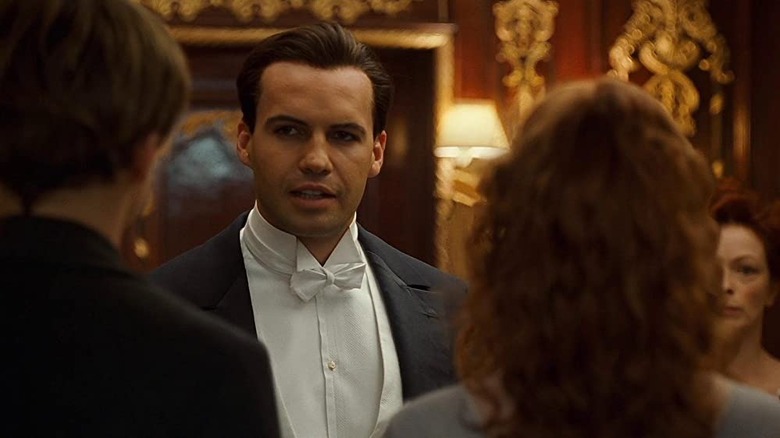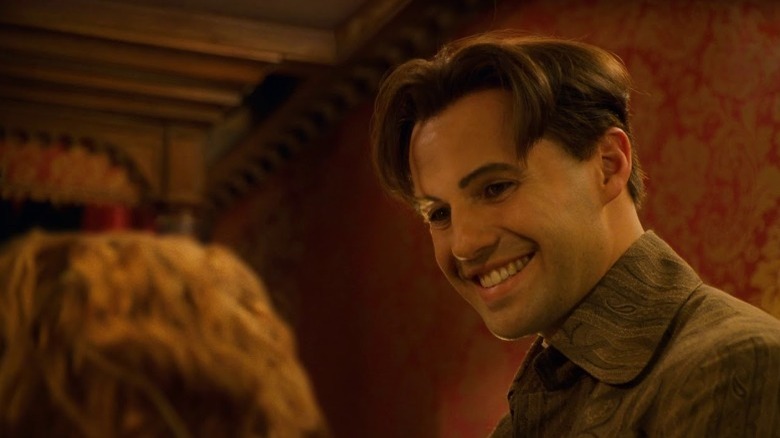
(To celebrate "Titanic" and its impending 25th-anniversary re-release, we've put together a week of explorations, inquires, and deep dives into James Cameron's box office-smashing disaster epic.)
"Something Picasso? He won't amount to a thing," declares the pompous one-percenter Caledon "Cal" Hockley (Billy Zane) with unwavering confidence, after Rose (Kate Winslet) expresses her fascination for the painter in James Cameron's "Titanic." Even 25 years after its release, Cameron's acclaimed disaster film continues to have a hold on us, and its doomed central romance still elicits debates about whether Jack (Leonardo DiCaprio) might've survived the ordeal. There's plenty to love about "Titanic" — Cameron weaves a bittersweet, almost-operatic odyssey about love and loss, where a fleeting encounter emerges as utterly transformative, and secondary characters also manage to be memorable. However, it is Zane's Cal who introduces a distinct brand of villainy to the drama that unfolds even before the ship hits the iceberg, where he sneers, condescends, and table-flips his way to the climax.
This obviously is not a defense of Cal's privileged entitlement and emotionally abusive behavior toward his fiancée. The dude is a smug slimeball through and through, and shamelessly amoral to the point that he claims to be a random kid's father to save his own skin. But boy, does he bring panache to the storyline while strutting around like he owns the ship and hatching petty, insecurity-fueled plans to separate two star-crossed lovers. There's something fascinating about Zane bringing a spoilt, misogynistic industrialist to life without boxing such a character into mere stereotypes. Cal is very much a product of his time, his privilege, and his social status, but when he is provided the opportunity to be better, he consciously chooses not to. This is in stark contrast with Jack's arc throughout the film, who repeatedly chooses radical empathy and makes peace with his imminent death just to ensure the safety of the person he loves. Cal Hockley could never relate.
An Obstinate Foil To The Beloved Duo

The legacy of "Titanic" is unsinkable, as media discourse about the film resurfaces once every few years, and rightly so. Rarely has a film had such a chokehold on mainstream sensibilities, where a story based on a real-life tragedy has succeeded in resonating with audiences across the board. Moreover, "Titanic" is delightfully re-watchable despite not being a tale doused in suspense — we know that the iceberg will sink the ship, we know that Jack will freeze to death, and we know that Rose will live to tell the tale. However, "Titanic" lulls us with its timeless charms and standout sequences, which, despite being corny, feel genuinely heartfelt and cathartic.
One of the core reasons why Jack and Rose's doomed tango of spontaneous love works is the fact that they remain faithful to one another against all odds. Gaping class and social divide aside, the "impossible" nature of Rose and Jack's romance is heightened due to the presence of Cal, who views his fiancée as his most prized possession and does not deem her as a person who should be granted the grace of free will. Even before Jack sets aboard the ship, Cal is painfully aware of Rose's distaste towards him, but he is deluded into believing that he can buy her expensive trinkets to coax her into accepting him.
The very impetus behind Cal gifting Rose the Heart of the Ocean is that it is a declaration of his control over her — a symbol of his unimaginable wealth — but the necklace assumes newfound meaning when Jack paints Rose naked, wearing only that. The necklace is now a symbol of passionate love and a token of their shared intimacy, something Cal is never able to embody or inch towards throughout the narrative.
An Insufferable Product Of His Time

Even in the heart of danger, Cal's instinct is to frame the man he views as an obstacle to his goals, and he does so in the pettiest way possible. To be able to evoke strong feelings in the audience even when the ship is falling apart is a testimony to Billy Zane's nuanced performance, where he goes from a mild 30 to a runaway 100 in the blink of an eye, especially when he chases the lovers with a pistol while folks are dying around him. Cal is so hyper-focused on coveting Rose and guided by his ego to demolish his rival (whom he viciously looks down upon) that he discards all pretenses of basic decency. The only hilarious aspect of these scenes is how perfectly slick Cal's hair looks in these action-intensive scenes and Zane's incredible line delivery of "I put the diamond in the coat. And I put the coat on her!" during the climax.
In a string of interviews about his character in "Titanic", Zane remarked that while Cal is an "unimaginable bastard," he empathizes with him as he was "misunderstood" and ultimately not the iceberg, as he "did not drown 2,000 people." While it is difficult to view a deeply misogynistic, spoilt brat who feels entitled to reciprocation without ever earnestly earning it as misunderstood, Zane's point about Cal being a reflection of his time does hold merit. Cal, a steel industrialist who walks into a room as if he owns it, is flabbergasted at the notion that he cannot have what he wants. The mere idea of Rose preferring a social nobody like Jack over him is so unfathomable that he is genuinely taken back when she spits on his face, along with everything he stands for.
Does Cal Hockley Bleed Deep Within?

Although Cal looks unfazed and continues to ensure self-preservation, Billy Zane's performance hints that there is more to this egotistical jerk. Although Cal's inability to unlearn the layers of toxic masculinity and class-based entitlement is his own failing, he is also trapped in the mindset of his era. The weight of his failings is too much to bear when he loses his wealth in the Wall Street Crash of 1929; there's something tragic about someone tying their worth exclusively to wealth, so much so they decide to cease living without it. As Cal was never able to appreciate himself without basing his value on social status, he extended this same cruelty to those around him. The result was a smug know-it-all who threw tantrums the moment he did not get his way, forever closed off to spontaneous emotions that plunged into the depths of humanity.
There has been some discourse surrounding Cal and his villain status in "Titanic," where he has been lauded as a hero instead or his actions have been entirely justified. I would argue the following: It is perfectly possible to recognize Cal as the deeply problematic, flawed antagonist who raises the stakes and still empathize with his eventual fate. Cal might've felt understandably jilted by Rose's blatant rejection, which led to him to lashing out the way he did. Again, it is understandable but not justifiable.
Nevertheless, "Titanic" would be incomplete without Zane's Cal, as it would be half a story about lost love and how it holds on to us for years to come. A love story worth rooting for through the ages requires a worthy foil, who manages to be sickly smooth and infuriating, and a bit complex all at once. For better or worse, Cal Hockley checks all the boxes.
Read this next: The 20 Greatest Human Villains In Movie History
The post Billy Zane is Titanic's Secret MVP appeared first on /Film.
0 Comments